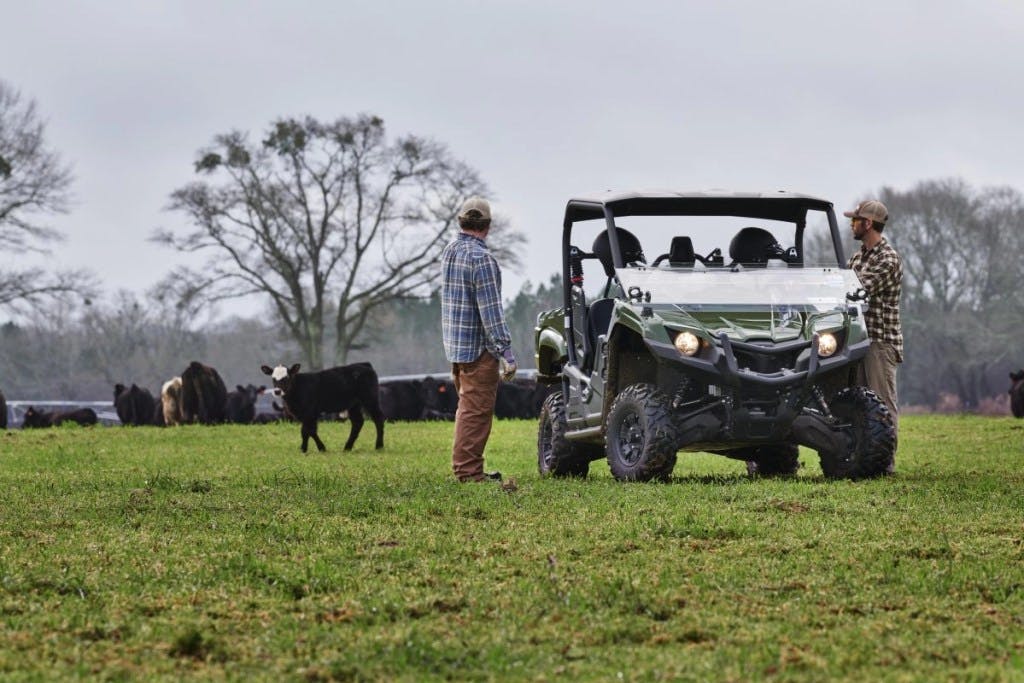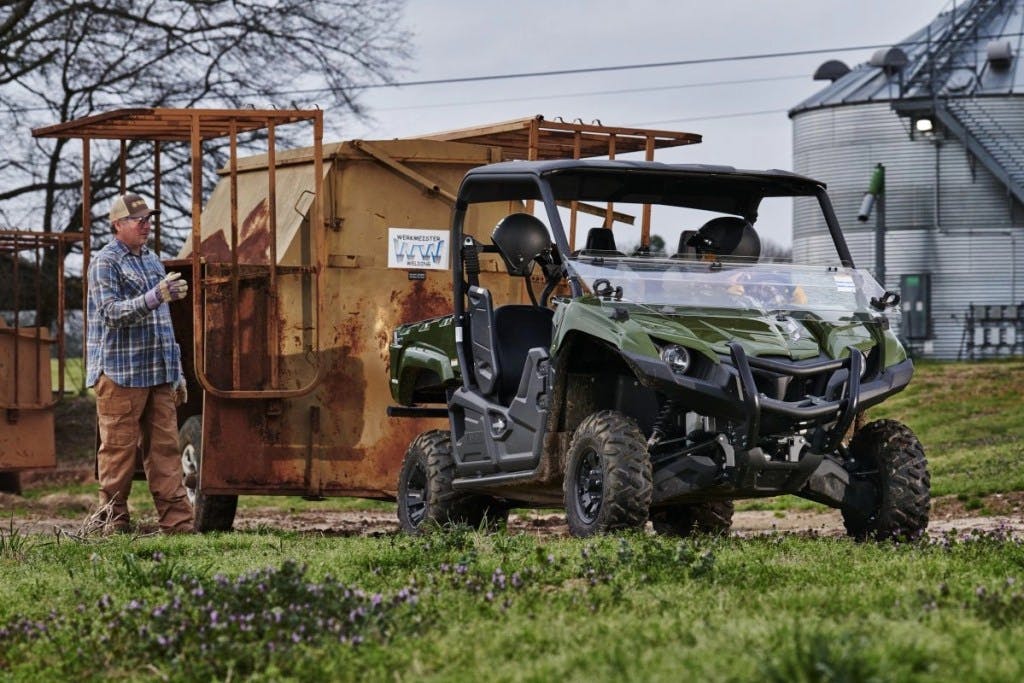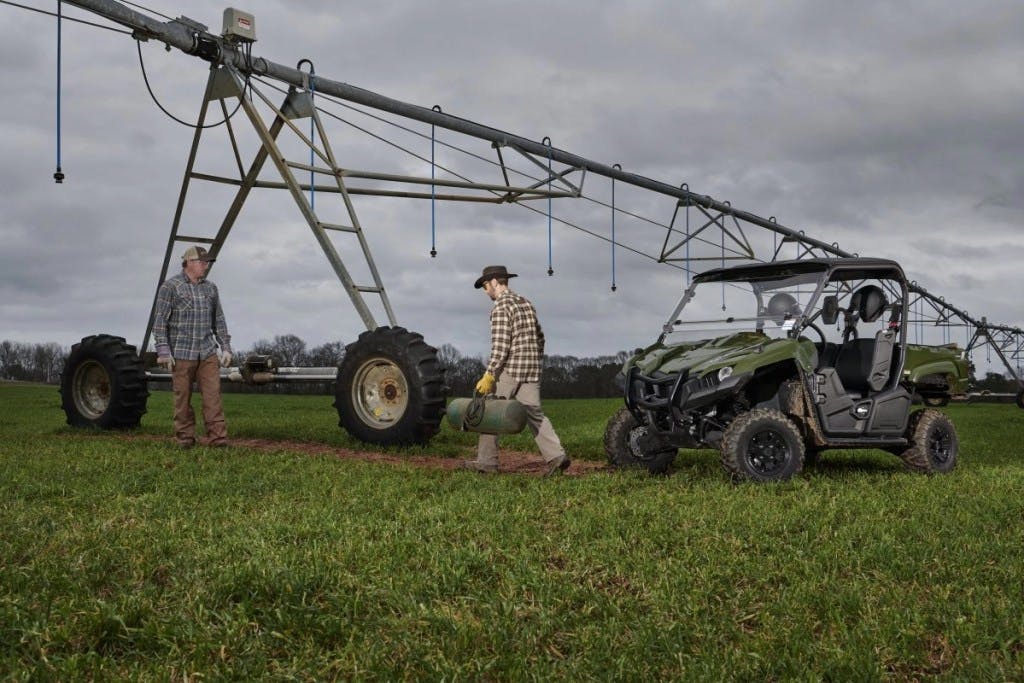2025 Yamaha Viking Buyer’s Guide

$15,799 MSRP
• Three seats
• steel bed
• 10-year belt warranty
Big Blue’s Workhorse
It’s been a while since the Yamaha Viking got an update, but that doesn’t change the fact that it still works as hard as anything else on the market. Its steel bed means that it can take a beating, and the 10-year belt warranty proves that its as reliable as the day is long.
Sure, it’s not hard to find a rig that matches the Viking’s capability, but it makes up for it in reliability. No more changing belts every few months, just put it to work and forget about it.

How much power does it make?
This is a tricky one, as Yamaha doesn’t give out power numbers for its rigs. Online discussion says that it’s around 50, which is on par for a 700-class engine. Speaking of the engine, the Viking makes power through a hefty 686cc SOHC single. That’s right, a 700-class single. That piston is about as big as my head.
That sends power to an Ultramatic CVT. What’s the difference between that and a traditional CVT? The Ultramatic is unique to Yamaha and uses an automatic centrifugal clutch, maintaining constant tension on the belt to reduce wear and tear.
What makes it special?
That transmission that we mentioned earlier allows for a 10-year belt warranty. Reliability is the main concern when buying a utility rig, and the Viking has that on lock.
Changing belts every season is a thing of the past, and you can even take it to Yamaha if the belt ever does break and they’ll replace it for you. That’s just one less thing to worry about, making it that much better of a utility rig.

Why do I want it?
If you want a bare-bones, all-work-no-play, reliable utility rig, the Viking might be perfect. It’s can haul 600 lbs through its rear dump bed and tow 1,500. Speaking of the bed, it’s steel. That’s nearly impossible to find in the Viking’s class, and is a stark contrast to the industry-standard plastic beds.
Why don’t I want it?
It’s no secret that the Viking is getting very old. It originally debuted in model year 2014, going over 10 years without a meaningful update. That’s old even for the car market, and absolutely ancient for side-by-sides.
It’s hard to find something out there in its class that’s worse than the it. The Can-Am Defender and Polaris Ranger both beat it out in towing and hauling with almost every trim. And the Defender definitely has it beat on the price.
Reliability definitely makes up for some of its shortcomings, but if you need the baddest utility rig on the market, look elsewhere.

What trim should I get?
This is an easy one, as Yamaha only offers two trims, the EPS and EPS Ranch Edition. And since the only difference between the two is color, a rearview mirror and leather seats, we’re going to save a grand and go with the EPS.
The 2025 Viking EPS starts at $15,799 and the 2025 Viking EPS Ranch Edition starts at $16,499.
If I like this… what else should I look at?
Just about any other utility side-by-side on the market will work as hard as the Viking. The Can-Am Defender, Polaris Ranger, and Kawasaki Mule are all great places to start. All of those models have more trims than we can count, so there is always one that fits your lifestyle.
2025 Yamaha Viking Specs
Length: 122.1i n.
Width: 61.8 in.
Height: 75.8 in.
Wheelbase: 84.1 in.
Claimed Dry Weight: 1,431 lbs
Engine: single-cylinder
Displacement: 686 cc
Transmission: Ultramatic V-belt with all-wheel engine braking CVT
Claimed Power: N/A
Claimed Torque: N/A
Fuel System: Yamaha Fuel Injection (YFI)
Steering: EPS
Drivetrain: 2WD, 4WD, full diff-lock 4WD
Front Suspension: Independent double wishbone; 8.1-in travel
Rear Suspension: Independent double wishbone; 8.1-in travel
Front Brakes: Dual hydraulic discs
Rear Brakes: Dual hydraulic discs
Wheels F/R: 12 in. steel
Tires F/R: AT25 x 8-12/ AT25 x 10-12
Bed Capacity: 600 lbs
Towing Capacity: 1,500 lbs.
Seating Capacity: 3
Ground Clearance: 11.8 in.
Fuel Capacity: 9.7 gal
